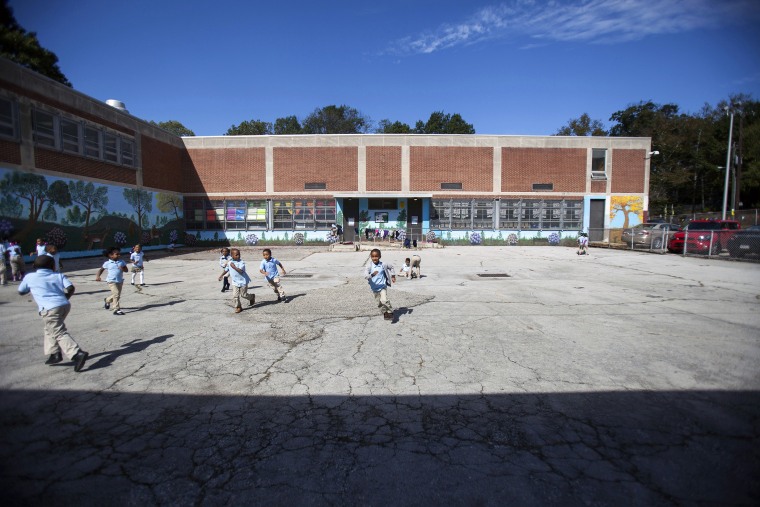In the battle for the survival of American teachers unions, Philadelphia has emerged as a major front. After years of escalating tensions, the ongoing conflict between Philadelphia Federation of Teachers (PFT) and the Philadelphia school district's state-appointed School Reform Commission (SRC) has now come to a head.
RELATED: On brink of further collapse, Philadelphia schools rescued (again)
Nearly two weeks ago, the SRC voted to unilaterally alter teachers' health care benefits, citing its inability to reach an agreement with the PFT after nearly two years of negotiations. The decision infuriated unionized teachers and their supporters, and on Thursday an estimated 3,000 protesters took to the streets to register their displeasure. The protest even drew the presence of Randi Weingarten, head of the national union AFT (American Teachers Federation). In a statement released the day of the SRC contract vote, Weingarten denounced the commission and Republican Gov. Tom Corbett, saying they had colluded on a "Hail Mary ambush" against teachers.
"Corbett's School Reform Commission has amped up a war on teachers and support staff, who have been the glue holding Philadelphia's schools together. Clearly and recklessly, the SRC is trying to provoke a strike, since there have been no real negotiations since SRC Chair Bill Green was appointed by the governor," she said.
Fernando Gallard, a spokesperson for the Philadelphia school district, said the decision to rewrite the district’s contract with the PFT “was driven by the needs of our schools,” which face major budget woes.
“We have a situation in our schools where there are literally just a couple hundred dollars of operating dollars to operate for the entire school year, and we needed to put the resources back into the schools,” he said. SRC's decision, he said, would save $54 million over the course of the school year.
Even before the SRC's latest move, its relationship with the teachers union wasn't exactly cordial. Over the past two years, the Philadelphia school district has laid off thousands of education professionals and cut its budget by millions of dollars, over the strident objections of the local labor movement. Starved of funds, the city's public schools very nearly missed its first day of classes in 2013. To add to the tension, Corbett initially declined to provide the district with $45 million in education funding until the PFT made some $100 million in contract negotiations -- an ultimatum he eventually withdrew in the face of public pressure.
State Sen. Vincent Hughes, a Democrat who represents parts of Philadelphia, said the SRC and Gov. Corbett were party to a coordinated attack on public education in the city.
"There's a national effort in Chicago, New Orleans and other places," he said. "You raise the standards for kids to graduate, then lower the resources for kids to graduate, and then you declare the school system doesn't work and we need to break it up; and, in some cases, privatize it."
Indeed, as fully public schools have flagged, privately managed charter schools in the city have soared, siphoning off students. In August, the bond rating agency Moody's cited that siphoning process as one of the key reasons for the school district's recent credit downgrade. "Charter school enrollment continues to push up costs," according to the rating agency, "and the district has limited authority to increase revenues to pay for those costs."
Not everyone who attended Thursday's rally was there to support the PFT. The Commonwealth Foundation, a conservative think tank in Philadelphia, turned out to distribute literature opposing the teachers union. The group has also launched a website, PFTFails.com, which seeks to demonstrate how PFT "fails teachers" and "fails kids and the poor." The group supports the proliferation of charter schools and school vouchers, as well as merit pay schemes that teachers unions tend to oppose.
"The unions have stood steadfast against giving educational opportunities that go beyond just the traditional public school system, whether it's charter schools, opportunity scholarships or tax credit scholarships," said Commonwealth Foundation president and CEO Matt Brouillette, a former private school history teacher. "They remain steadfast against letting poor parents make choices in education."
He argued that charter schools are able to do "more with less," in part because of reduced labor costs. Charter schools are more likely to be non-union than public schools.
"With labor costs being the highest portion of any school's operation, the lack of unions in charter schools has given them the freedom and the ability to manage their resources while at the same time rewarding high performing teachers rather than the traditional union model," he said.
RELATED: Another Philadelphia student dies at a public school with no nurse
But state Senator Hughes believes the spread of charter schools in Philadelphia is more about making money for investors than it is about providing a superior education. Teachers and other education professionals "are being demonized because people want to break them, and the only reason people want to break them is because they want access to the money," he said.
